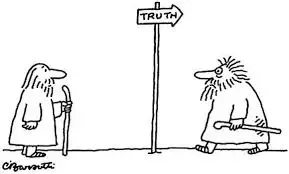A Philosophical Soiree Over The Phone

Philosophy Cartoon made by Charles Barsotti
When asked, “what is philosophy?” Delta State University’s campus-coined philosophical guru Dr. Eugene Tibbs pauses briefly while putting words into thought, thought into reason, and reason into possibilities, as any philein Sophia (Greek for the lover of wisdom), must.
Dr. Tibbs begins by identifying the etymology of philosophy: “Philosophy in Latin is the love of wisdom.” The professor proceeds to identify “wisdom” as also being an obscure term in itself.
Philosophy is a subject that seeks to answer questions that others either dare not to or wouldn’t know where to begin in the first place. It is a subject that tends to focus on the relationship between people and the world, and that relationship is a specific kind that usually finds itself set within, for lack of a better word, the big questions.
The term philosophy can be characterized as general implications see fit somewhere between the logical and the transcendental.
Why Do We Believe What We Believe?
Dr. Tibbs describes this as the mysticism of “extended thinking.” He digs a bit further by saying, “philosophy is about questions. And these questions have answers, but those answers are always in dispute.”
Tibbs mentions a story involving a specific scenario: Imagine a man that is stranded without food in the middle of the ice. The man decides to fall onto his knees and pray for help. The man gets saved by a group of people rather mysteriously.
Now, there are two theories. God saved him by answering the prayer, or that a group of people was walking by at the right time.
Here is the catch — whatever someone chooses to believe, that belief is just as right as the other, and both questions could be argued for just as well.
According to Tibbs, philosophy becomes choosing your own individualized beliefs. You alone must decide what belief is fact and what is not because the only fact here is that there is no correct answer.
A fine introduction into the philosophical mindset it is.
What Do Philosophers Do?
Many people probably picture an explorer of philosophy as wearing long robes and toting gold-coated books of understanding. When asked what it is exactly that philosophers do with their time, Dr. Tibbs responds, “they don’t spend enough time taking care of their car as they probably should,” he says.
Tibbs differentiates between a bonafide philosopher with a doctorate and someone who teaches the subject. In order to attain the title of “philosopher,” you must some way, impact the world around you. That be shaping another person’s future or shaping politics.
Richard Rority, a former lawyer, could fit the description of a philosopher as he was formerly becoming of the late literary accomplishment, “Justice.” It goes on to become acknowledged for its philosophical significance by multiple scores of our very own American Commander and Chiefs.
But, what is it that inspires such a seeking of knowledge? What told who to learn what? And why did that desire for an answer arrive at Dr. Tibbs’ doorstep?
Dr. Tibbs’ interest was sparked in philosophy at the Catholic University of America with specific questions dealing with the New Testament: “Who wrote the New Testament of the Christian Bible?” and “Who was the intended audience?”
These higher questions of life are the surface of all philosophical pondering. In religion, we ask, “Who is God?” and “Is there life after death?” About the paranormal, we ask, “What is out there that we don’t know, or is nothing out there at all?” To connect quantitative and qualitative science, we ask, “What can mathematical applications not do?” Questions such as these are subjects Dr. Tibbs continues to explore in-depth.
What Is a Good Life?
That is fitting, but what about the good stuff, right? Everyone should ask what could not be asked with anyone else, “What is a good life?”
A gust of optimism rushed back as soon as these words were spoken through the phone-call. Tibbs answers that “in Latin, good means to know how to live well, but what does ‘live well’ mean?”
This is a question that mustered as monumental in the days of Ancient Greece with figures like Aristotle, Plato, and Socrates. According to Dr. Tibbs, in the ideology of what it is to truly live, people should strive for that golden middle, and that middle is a line that sits upon the border of excess and deficiency.
As people, Dr. Tibbs explains, “we cannot go too far this way or too far that way, and it is finding that fine balance within human existence that makes it so very ideal.”
“We must also not fear the pull to deem ourselves so very heavily in one task over the other,” Tibbs says. “People do, in fact, find joy; some of those joys may become stronger than others. Those joys could become a passion, and that passion is something that cannot be ignored.”
Did you really learn anything if your thoughts aren’t struck with the provocative delight of the incorporeal, metaphysical, or metaphorical from an interview with a philosopher?

Caleb Giachelli, a level 192 Altmerian-High-Elf warrior in the world of Skyrim, is usually super setting chest and biceps and sometimes can be found snapkicking...


